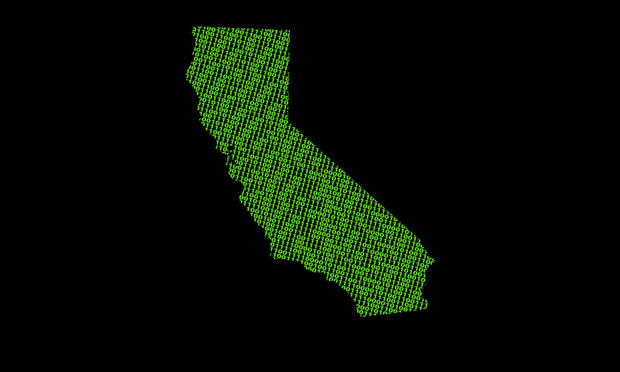California Consumer Privacy Act Compliance Tools Take Off
The California Consumer Protection Act (CCPA) arrives next year, which is good news for developers of compliance solutions looking to open up new customer bases.
March 15, 2019 at 03:30 PM
3 minute read
The original version of this story was published on Legal Tech News

At this point, the phrase “there's an app for that” is almost definitely a cliché, but in the case of the many, many privacy regulations cropping up around the globe, it's a cliché that happens to be true.
As luck would have it, the forthcoming California Consumer Privacy Act (CCPA) is both similar and just different enough from the General Data Protection Regulation (GDPR) to pose a whole new set of threats to companies dealing and consumer data, which means that you should expect to see a new slew of compliance tools on the horizon.
“I think that companies are trying to figure out, 'Well, I can't spend infinite dollars to address this issue. How do I take a finite budget and address these issues?'” said Tomu Johnson, an attorney with Parsons Behle & Latimer and CEO of its subsidiary, Parsons Behle Lab.
Johnson's company created CCPA IQ, a compliance solution that echoes the similarly named GDPR IQ tool Parsons Behle Lab released early in that regulation's lifespan. Think of it like any one of the dozens of iterations on Coca-Cola—the originally recipe tweaked as needed to achieve the desired flavor.
When it comes to a solution like CCPA IQ, that meant paring back on redundant elements such as privacy-by-design (which is exclusive to the GDPR) and building in more intelligence to address the increased specificity the CCPA requires companies to provide with regards to the information they're collecting from consumers.
“We bolster up and add new logic and new questions in order to get at, what are the specific pieces of information that you are gathering from people? Bolster up some of the trade because there are specific trading requirements under the CCPA,” Johnson said.
Parsons Behle Lab isn't the only provider looking to serve as an ice pack for compliance pain points. Earlier this week, TrustArc announced new features within its platform that were designed specifically in response to California's incoming privacy regulations.
Dave Deasy, the company's senior vice president of marketing, said TrustArc was able to gain tremendous leverage from their preexisting GDPR compliance products as they looked towards the CCPA. Especially useful were mechanisms that had been developed to create data inventories and flows, a necessary first step in the journey towards either CCPA or GDPR compliance.
He thinks the CCPA opens up a new market of potential customers that can be placed in to two buckets. In the first, there are institutions—banks, healthcare companies, utilities—that don't maintain a significant presence in Europe and thus didn't invest much in GDPR compliance.
“You have a whole wave of companies that are starting to deal with these very broad and complex complaints just for the first time,” Deasy said.
Other potential clients for CCPA compliance apps are companies who put off GDPR prep until the last minute and were forced to put a lot of the necessary framework into place manually in order to make the compliance date. Having learned a lesson the hard way the first time around, they may be more inclined to seek out a technological assist for the CCPA.
“You're seeing companies kind of go back and look at things and say 'OK, we did a lot of this manually the first time around. We really can't afford to do it manually again,'” Deasy said.
This content has been archived. It is available through our partners, LexisNexis® and Bloomberg Law.
To view this content, please continue to their sites.
Not a Lexis Subscriber?
Subscribe Now
Not a Bloomberg Law Subscriber?
Subscribe Now
NOT FOR REPRINT
© 2025 ALM Global, LLC, All Rights Reserved. Request academic re-use from www.copyright.com. All other uses, submit a request to [email protected]. For more information visit Asset & Logo Licensing.
You Might Like
View All
Law Firms Look to Gen Z for AI Skills, as 'Data Becomes the Oil of Legal'



Trending Stories
- 1Understanding the HEMS Standard in Trusts
- 2Mergers Are About People, Not Paperwork: Here’s Why
- 3Wachtell Partner Leaves to Chair Latham's Liability Management Practice
- 4Morris Nichols Partners to Be Involved With PLI Program
- 5How I Made Practice Group Chair: 'Cultivating a Culture of Mutual Trust Is Essential,' Says Gina Piazza of Tarter Krinsky & Drogin
Who Got The Work
J. Brugh Lower of Gibbons has entered an appearance for industrial equipment supplier Devco Corporation in a pending trademark infringement lawsuit. The suit, accusing the defendant of selling knock-off Graco products, was filed Dec. 18 in New Jersey District Court by Rivkin Radler on behalf of Graco Inc. and Graco Minnesota. The case, assigned to U.S. District Judge Zahid N. Quraishi, is 3:24-cv-11294, Graco Inc. et al v. Devco Corporation.
Who Got The Work
Rebecca Maller-Stein and Kent A. Yalowitz of Arnold & Porter Kaye Scholer have entered their appearances for Hanaco Venture Capital and its executives, Lior Prosor and David Frankel, in a pending securities lawsuit. The action, filed on Dec. 24 in New York Southern District Court by Zell, Aron & Co. on behalf of Goldeneye Advisors, accuses the defendants of negligently and fraudulently managing the plaintiff's $1 million investment. The case, assigned to U.S. District Judge Vernon S. Broderick, is 1:24-cv-09918, Goldeneye Advisors, LLC v. Hanaco Venture Capital, Ltd. et al.
Who Got The Work
Attorneys from A&O Shearman has stepped in as defense counsel for Toronto-Dominion Bank and other defendants in a pending securities class action. The suit, filed Dec. 11 in New York Southern District Court by Bleichmar Fonti & Auld, accuses the defendants of concealing the bank's 'pervasive' deficiencies in regards to its compliance with the Bank Secrecy Act and the quality of its anti-money laundering controls. The case, assigned to U.S. District Judge Arun Subramanian, is 1:24-cv-09445, Gonzalez v. The Toronto-Dominion Bank et al.
Who Got The Work
Crown Castle International, a Pennsylvania company providing shared communications infrastructure, has turned to Luke D. Wolf of Gordon Rees Scully Mansukhani to fend off a pending breach-of-contract lawsuit. The court action, filed Nov. 25 in Michigan Eastern District Court by Hooper Hathaway PC on behalf of The Town Residences LLC, accuses Crown Castle of failing to transfer approximately $30,000 in utility payments from T-Mobile in breach of a roof-top lease and assignment agreement. The case, assigned to U.S. District Judge Susan K. Declercq, is 2:24-cv-13131, The Town Residences LLC v. T-Mobile US, Inc. et al.
Who Got The Work
Wilfred P. Coronato and Daniel M. Schwartz of McCarter & English have stepped in as defense counsel to Electrolux Home Products Inc. in a pending product liability lawsuit. The court action, filed Nov. 26 in New York Eastern District Court by Poulos Lopiccolo PC and Nagel Rice LLP on behalf of David Stern, alleges that the defendant's refrigerators’ drawers and shelving repeatedly break and fall apart within months after purchase. The case, assigned to U.S. District Judge Joan M. Azrack, is 2:24-cv-08204, Stern v. Electrolux Home Products, Inc.
Featured Firms
Law Offices of Gary Martin Hays & Associates, P.C.
(470) 294-1674
Law Offices of Mark E. Salomone
(857) 444-6468
Smith & Hassler
(713) 739-1250






